I am trying to code this algorithm. I am stuck in the part of log((1.0-u)/u))/beta;
As I understand, I can not get the result of this in C, as it will always return me with negative value log (returning imaginary value).
Tried to print the result of log(1-5) for instance, it gives me with Nan.
How can I get the result of
double x = (alpha - log((1.0-u)/u))/beta
then?
Would appreciate for any pointers to solve this problem.
Thank you
